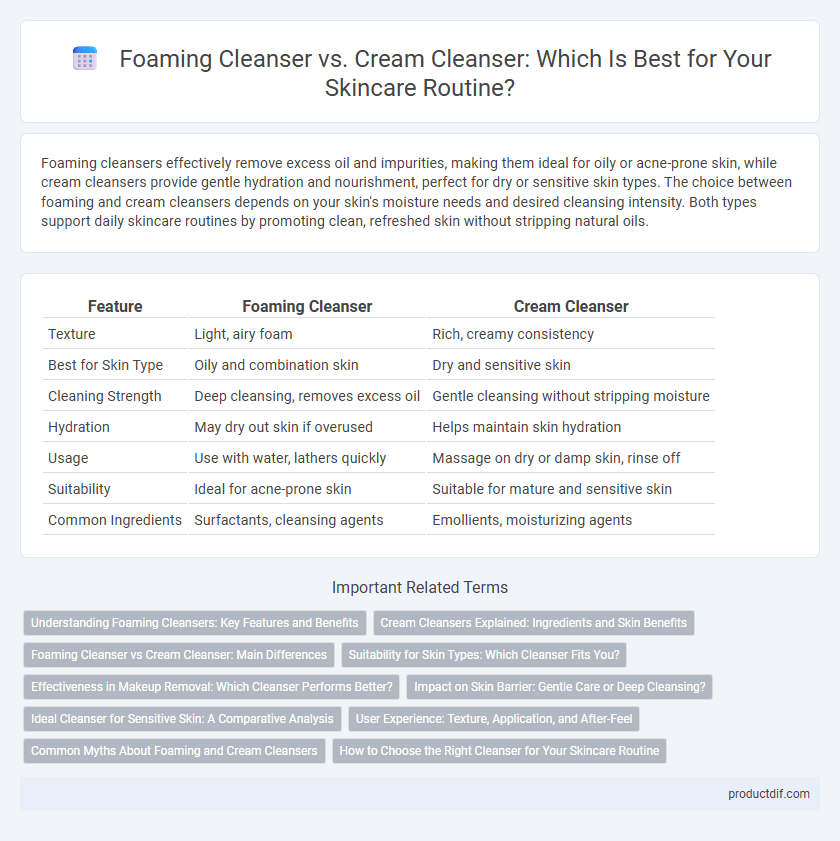Foaming cleansers effectively remove excess oil and impurities, making them ideal for oily or acne-prone skin, while cream cleansers provide gentle hydration and nourishment, perfect for dry or sensitive skin types. The choice between foaming and cream cleansers depends on your skin's moisture needs and desired cleansing intensity. Both types support daily skincare routines by promoting clean, refreshed skin without stripping natural oils.
Table of Comparison
| Feature | Foaming Cleanser | Cream Cleanser |
|---|---|---|
| Texture | Light, airy foam | Rich, creamy consistency |
| Best for Skin Type | Oily and combination skin | Dry and sensitive skin |
| Cleaning Strength | Deep cleansing, removes excess oil | Gentle cleansing without stripping moisture |
| Hydration | May dry out skin if overused | Helps maintain skin hydration |
| Usage | Use with water, lathers quickly | Massage on dry or damp skin, rinse off |
| Suitability | Ideal for acne-prone skin | Suitable for mature and sensitive skin |
| Common Ingredients | Surfactants, cleansing agents | Emollients, moisturizing agents |
Understanding Foaming Cleansers: Key Features and Benefits
Foaming cleansers produce a rich lather that effectively removes dirt, oil, and makeup from the skin, making them ideal for oily and combination skin types. They typically contain surfactants that help cleanse pores deeply while maintaining the skin's natural moisture balance. Key benefits include a refreshing sensation, ease of rinsing, and a lightweight formula that prevents clogging and leaves the skin feeling clean and revitalized.
Cream Cleansers Explained: Ingredients and Skin Benefits
Cream cleansers contain moisturizing ingredients such as glycerin, oils, and emollients that gently dissolve makeup and impurities without stripping the skin's natural barrier. Rich in hydrating components like shea butter and ceramides, these cleansers are ideal for dry or sensitive skin, providing nourishment while cleansing. Their creamy texture soothes irritation and maintains skin elasticity, making them effective for maintaining balanced, radiant skin.
Foaming Cleanser vs Cream Cleanser: Main Differences
Foaming cleansers produce a rich lather that effectively removes oil and impurities, making them ideal for oily or combination skin types. Cream cleansers have a thicker, moisturizing formula designed to cleanse without stripping natural oils, which suits dry and sensitive skin. The main differences lie in texture, cleansing strength, and suitability for various skin conditions.
Suitability for Skin Types: Which Cleanser Fits You?
Foaming cleansers are ideal for oily and acne-prone skin as they effectively remove excess sebum and impurities without leaving a residue, promoting a deep clean feeling. Cream cleansers suit dry and sensitive skin types by providing gentle hydration and nourishment, preventing dryness and irritation during the cleansing process. Choosing a cleanser based on skin type ensures optimal skin balance, minimizing issues like breakouts or tightness after washing.
Effectiveness in Makeup Removal: Which Cleanser Performs Better?
Foaming cleansers effectively remove makeup by lifting and dissolving oils, making them ideal for oily and combination skin types prone to heavy makeup buildup. Cream cleansers provide gentle yet thorough cleansing, preserving moisture while efficiently breaking down makeup, especially beneficial for dry and sensitive skin. Studies show foaming cleansers excel in removing waterproof makeup, but cream cleansers better maintain skin barrier integrity during the cleansing process.
Impact on Skin Barrier: Gentle Care or Deep Cleansing?
Foaming cleansers create a rich lather that effectively removes excess oil, dirt, and makeup, making them ideal for oily or acne-prone skin but potentially disrupting the skin barrier if overused. Cream cleansers offer a gentler, moisturizing formula that supports the skin barrier's integrity by cleansing without stripping natural oils, suitable for dry or sensitive skin types. Choosing between foaming and cream cleansers depends on individual skin needs, balancing deep cleansing with maintaining a healthy, hydrated skin barrier.
Ideal Cleanser for Sensitive Skin: A Comparative Analysis
Foaming cleansers effectively remove excess oil and impurities, making them suitable for oily and acne-prone sensitive skin due to their deep-cleansing properties. Cream cleansers provide gentle hydration and maintain the skin's moisture barrier, ideal for dry or irritated sensitive skin types needing soothing care. Choosing between foaming and cream cleansers depends on skin sensitivity, hydration needs, and tolerance to surfactants commonly found in foaming formulas.
User Experience: Texture, Application, and After-Feel
Foaming cleansers create a rich lather that feels light and refreshing on the skin, absorbing quickly without residue, making them ideal for oily or combination skin types. Cream cleansers offer a thicker, more moisturizing texture that glides smoothly during application and leaves the skin feeling soft and hydrated, especially beneficial for dry or sensitive skin. The after-feel of foaming cleansers is often clean and matte, while cream cleansers provide a nourishing, soothing finish that helps maintain the skin's natural moisture barrier.
Common Myths About Foaming and Cream Cleansers
Foaming cleansers are often mistakenly believed to strip the skin of all natural oils, but many formulations are actually designed to maintain moisture balance while effectively removing dirt and impurities. Cream cleansers are commonly thought to be only suitable for dry skin; however, they can also benefit sensitive and combination skin by providing gentle cleansing without irritation. Both cleanser types have diverse formulations tailored to different skin needs, debunking the myth that one is universally better than the other.
How to Choose the Right Cleanser for Your Skincare Routine
Selecting the right cleanser depends on your skin type and specific concerns; foaming cleansers are ideal for oily or acne-prone skin due to their deep-cleansing and oil-removing properties, while cream cleansers suit dry or sensitive skin by providing gentle hydration and nourishment. Consider your skin's hydration needs and tolerance to ingredients such as surfactants and emollients when comparing foaming versus cream cleansers. Incorporate a cleanser that balances cleansing efficacy with moisturizing benefits to maintain your skin's natural barrier and achieve optimal skincare results.
Foaming Cleanser vs Cream Cleanser Infographic

 productdif.com
productdif.com